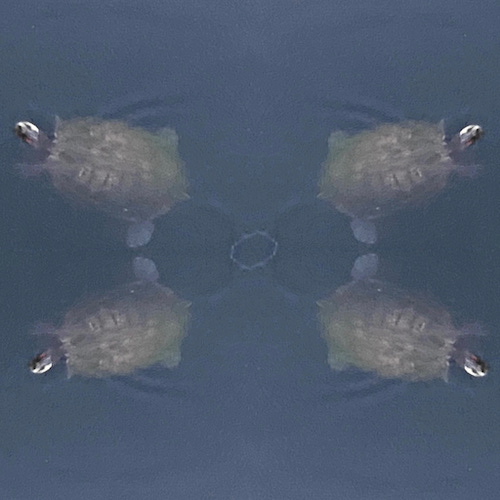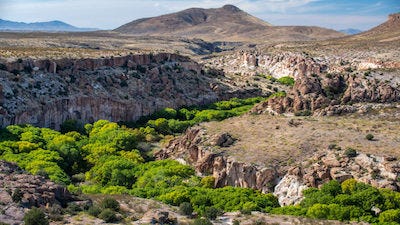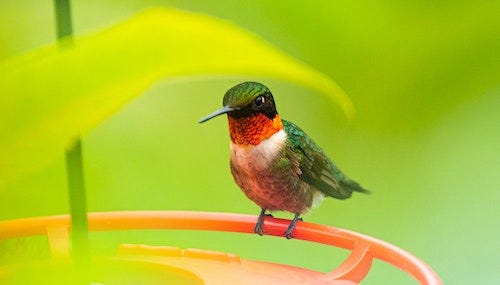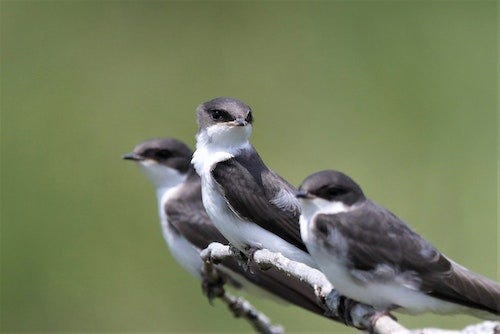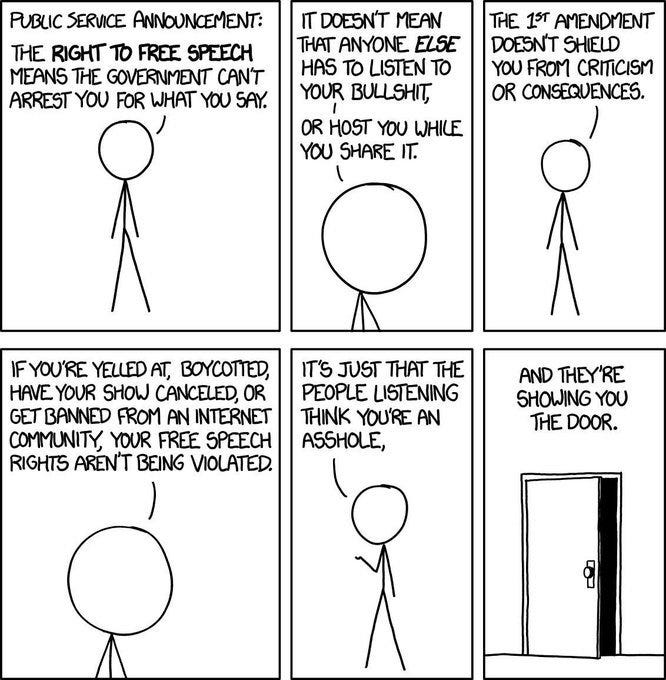The Weird Times: Issue 61, July 11 2021 (V2 #9)
It's not what you look at that matters, it's what you see – Henry David Thoreau
Stuck in a heat wave?
Here are four ways to cool off.
Choose a direction.
—Alexis Krasilovsky
“If we never fail, we don’t publish enough. It’s a creative business. And, yes, it’s a risky business. It’s a portfolio business. Our very name—Random House—says it all. Random House comes from the fact that everything in publishing is random, including producing breakout bestsellers. And thank god. Because if we had the formula for bestsellers, we would only publish bestsellers. So thank god it’s random, thank god it’s unpredictable. There is no formula. In essence every book is a new creative entrepreneurial endeavor or venture.” —Marcus Dohle, CEO, Penguin Random House
It’s a funny thing to write about the Fourteenth Amendment in the twenty-first century. I am a scholar of Reconstruction, and for me the Fourteenth Amendment conjures up images of late-1860s Washington, D.C., a place still plagued by malaria carried on mosquitoes from the Washington City Canal, where generals and congressmen worried about how to protect the Black men who had died in extraordinary numbers to defend the government while an accidental president pardoned Confederate generals and plotted to destroy the national system Abraham Lincoln had created.
It should feel very distant. And yet, while a bipartisan group of senators rejected Bork’s nomination in 1987, in 2021 the Supreme Court is dominated by originalists, and the principles of the Fourteenth Amendment seem terribly current.
—Heather Cox Richardson, Letters from an American, 7/9/21
It’s getting hot out there
‘We live in a desert. We have to act like it’: Las Vegas faces reality of drought, Oliver Millman, The Guardian, 7/9/21
Lake Mead, the vast reservoir that supplies Las Vegas with 90% of its water, has now plummeted to a historic low, meaning Nevada faces the first ever mandatory reduction in its water supply next year. This looming cutback is forcing restrictions upon the city that has somehow managed to thrive as a gaudy oasis in the baking Mojave desert.
Wildlife, air quality at risk as Great Salt Lake nears low, Lindsay Whitehurst, Washington Post, 7/6/21
“A lot us have been talking about the lake as flatlining,” said Lynn de Freitas, executive director of Friends of the Great Salt Lake.
The lake’s levels are expected to hit a 170-year low this year. It comes as the drought has the U.S. West bracing for a brutal wildfire season and coping with already low reservoirs. Utah Gov. Spencer Cox, a Republican, has begged people to cut back on lawn watering and “pray for rain.”
Once a Rich Desert River, the Gila Struggles to Keep Flowing: The Gila was once a vibrant desert river, providing a lifeline for the riparian habitat and wildlife that depended on it in the U.S. Southwest. But population growth, agricultural withdrawals, and, increasingly, climate change have badly diminished the river and threaten its future, Jim Robbins, Yale e360, 7/8/21
Last year was the second-hottest and second-driest on record in Arizona, where heat records are frequently broken. The last two years have seen fewer desert downpours, known locally as monsoons, an important source of summer river flow.
“We’re dealing with a rapidly changing climate that is becoming, overall, more dry and varied and warmer,” said Scott Wilbor, an ecologist in Tucson who studies desert river ecosystems, including the San Pedro. “We are in uncharted territory.”
A Massive Water Recycling Proposal Could Help Ease Drought: Members of Congress from Western states are pushing for $750 million to turn wastewater into pure water. Here’s how that works, Matt Simon, Wired, 7/7/21
As the West withers under extreme drought, legislators in the US House of Representatives have introduced HR 4099, a bill that would direct the Secretary of the Interior to create a program to fund $750 million worth of water recycling projects in the 17 western states through the year 2027. (The bill, which was introduced at the end of June, is currently before the House Committee on Natural Resources.)
“This is beginning to be our new normal—88 percent of the West is under some degree of drought,” says Representative Susie Lee (D-Nevada), who introduced the bill. “Lake Mead is at the lowest level it has been at since the Hoover Dam was constructed. And the Colorado River has been in a drought for more than two decades.”
Birdland
Songbirds are mysteriously dying across the eastern U.S. Scientists are scrambling to find out why, David Malakoff, Erik Stokstad, Science, 7/6/21
Despite the uncertainty, researchers are beginning to get a clearer picture of the outbreak, thanks in part to thousands of people who have responded to calls from government agencies and scientists to report sick or dead birds. Not all species, for example, appear to be at high risk. “It’s been quite species specific,” says veterinarian Megan Kirchgessner of the Virginia Department of Wildlife Resources. So far, most cases involve just four species—common grackles, blue jays, American robins, and European starlings—according to a 2 July statement from the U.S. Geological Survey’s National Wildlife Health Center. Young birds appear to be especially susceptible.
Endangered bird found on Maunakea for first time in nearly 70 years, Michael Brestovansky, Hawaii Tribune-Herald, 7/9/21
University of Hawaii at Hilo researchers announced Thursday that they located an ‘ua‘u — a seabird also called the Hawaiian petrel — at a nesting site on Maunakea in May, the first time one has been recorded on the mauna since 1954.
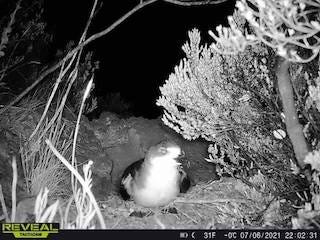
Role of dopamine in songbird's brain plasticity: Neurotransmitter shown to be a key driver in sensory processing, UMass Amherst, Science Daily, 7/2/21
Neuroscientists at the University of Massachusetts Amherst have demonstrated in new research that dopamine plays a key role in how songbirds learn complex new sounds.
Published in the Journal of Neuroscience, the finding that dopamine drives plasticity in the auditory pallium of zebra finches lays new groundwork for advancing the understanding of the functions of this neurotransmitter in an area of the brain that encodes complex stimuli.
Owls, Swallows and Bluebirds: The Secret Allies of Farmers,Lisa Morehouse, KQED, 7/2/21
“Our estimate is that a family of barn owls removes 3,400 rodents from the landscape every year,” Johnson said. “So some of these farms, like this one that has 20 occupied boxes, you're talking about 70,000 rodents removed every year.”
Who hears the regrets
of the thieving automobile?
—from “Book of Questions,” Pablo Neruda
Accentuate the Positive
Scientists have long warned climate change threatens our food security. Now they’re finding solutions: We've barely scratched the surface on the potential of plants, Nathanael Johnson, Grist, 7/8/21
Research on plant heat stress is blooming as techniques improve and as scientists map the genomes of major crops. Colleen Doherty, an associate professor of biochemistry at North Carolina State University, is one of the researchers working to figure out how we can feed ourselves, while using less land, and allowing forests and habitats to regrow.
“And we can do it, we’ve barely touched the potential of plants,” Doherty said.
Op-ed: Embracing rainwater through green infrastructure: The US can tackle climate change driven flooding in vulnerable communities by building nature-based solutions into infrastructure plans, Mary Pat McGuire, The Daily Climate, 7/9/21
A transition from gray-to-green infrastructure is especially critical for older industrial cities with aging, often combined sanitary-sewer stormwater infrastructure that, while novel a century ago, today needs rethinking and intervention. Streets with stormwater inlets are the de-facto unnatural "tributaries" to these underground conveyance pipes. Rather than repave streets or increase the size of underground pipes and tunnels, a third way seems more appropriate—nature-based solutions can replace part of that street surface to infiltrate water naturally. Win-win-win.
But the shift from gray to green isn't just a technical fix—it's also a social one.
Mystery Solved: How Plant Cells Know When to Stop Growing - The discovery could have a profound effect on cell research for many species of plants and animals, as well as the future of crops, Katrina Miller, Wired, 7/8/21
The secret to cell size regulation, the scientists realized, lies in the concentration of KRP4 in each new cell. Though the daughter cells inherit an equal amount of KRP4, because they might be different sizes, the concentration of this protein in each cell isn’t necessarily the same. As the scientists observed under the microscope, smaller cells started with a higher concentration of KRP4 and spent more time growing. For bigger cells, the concentration was diluted, so they grew less. Overall, this balanced out any asymmetries in cell size across the plant’s growing tip. Mystery solved.
Why declining birth rates are good news for life on Earth: In the midst of a climate crisis with 8 billion humans on the globe, it’s absurd to say that what’s lacking is babies, Laura Spinney, The Guardian, 7/8/21
Covid-19 has temporarily exacerbated the longer-term decline in fertility rates. This, too, was predictable. Familiarity breeds contempt and children, quipped Mark Twain, but only the first part holds in a pandemic. As more data comes in on this, expect more headlines about once-great nations abstaining themselves into oblivion. Don’t believe them. We do need solutions, but they don’t have to look like babies.
Armed Afghan women take to streets in show of defiance against Taliban: Women in north and central regions of country stage demonstrations as militants make sweeping gains nationwide, Emma Graham-Harrison, The Guardian, 7/7/21
“There were some women who just wanted to inspire security forces, just symbolic, but many more were ready to go to the battlefields,” said Halima Parastish, the head of the women’s directorate in Ghor and one of the marchers. “That includes myself. I and some other women told the governor around a month ago that we’re ready to go and fight.”
An Indigenous Group’s Objection to Geoengineering Spurs a Debate About Social Justice in Climate Science: The Sámi people of Northern Sweden say blocking out the sun with reflective particles to cool the earth is the kind of thinking that produced the climate crisis in the first place, Haley Dunleavy, Inside Climate News, 7/7/21
But the council’s opposition has renewed global debate about the role of geoengineering and other types of actions to reduce warming and who gets to make the decision about whether, when and where to implement them. In many ways, the controversy in Sweden is a microcosm of the broader issues: Should scientists continue to research geoengineering in the face of multiple ethical and physical risks? And how do scientists make sure that Indigenous voices are included in discussions on climate solutions?
Plastic is killing our planet. Will the consumer packaged goods industry step up? The companies that make packaged household goods, from dish soap to shampoo, have been complicit in creating a society addicted to single-use plastic. But it doesn’t have to stay that way, Stuart Landesberg, Fast Company, 7/6/21
The products that keep your laundry clean, your hair shiny, and your cupboard stocked do not have to come in plastic to do their jobs. The products we design and market are effective because of what’s in the bottle, not because of the plastic bottle itself. We, the CPG industry, can take action on plastic and still deliver the grease-lifting clean that you understandably demand from your dish soap. New brands, new business models, and an authentic commitment to creating a better future can change the path forward.
World’s Largest Seagrass Project Proves “You Can Actually Restore the Oceans”A “game changing” 20-year effort suggests that even severely depleted marine ecosystems can be brought back to life, Laura Paddison, Reasons to Be Cheerful, 7/6/21
McGlathery, an environmental sciences professor at the University of Virginia, is part of a team running the largest seagrass restoration project in the world in these coastal bays — and one of the most successful. The two-decade-long project is a “blueprint for restoring and maintaining healthy ecosystems,” according to a 2020 research paper, and proof that marine habitats can be brought back to life in a way that’s self-sustaining.
Making seawater drinkable in minutes: A new alternative seawater desalination membrane to produce drinking water, NATIONAL RESEARCH COUNCIL OF SCIENCE & TECHNOLOGY, Eurekalert, 6/29/21
The Korea Institute of Civil Engineering and Building Technology (KICT) has announced the development of a stable performance electrospun nanofiber membrane to turn seawater into drinking water by membrane distillation process.
Hispanic voters and the American Dream: How Democrats can nip the shift toward the GOP in the bud, Noah Smith, Noahpinion, 7/4/21
If they want to make sure that the Hispanic trend toward the GOP remains a blip, Democrats need to start talking about the American Dream again. And more than that, they need to focus their policies on upward mobility for working-class and middle-class strivers.
What it Means to be Wild: Against the backdrop of a world so thoroughly altered by humankind, Emma Marris's latest book, Wild Souls, challenges our assumptions about nature and how we protect it, Ashley Braun, BioGraphic, 7/8/21
“We’ve touched many animal species so deeply with our wholesale reshaping of planet Earth that we have likely altered their evolutionary trajectories. I wanted to know whether the massive human impact on Earth changes our obligations to animals. What about animals, like the polar bear, that have lost their hunting grounds because of melting sea ice? Do we have an obligation to feed them? What about wild wolves who mate with feral dogs? Should we stop them? What about introduced mice preying on rare seabirds? Should we poison them? In a human-altered world, it seems impossible to just keep saying that our only ethical responsibility to “wild” animals is to “let nature take its course.” It was still unclear to me, though, exactly what this enhanced responsibility might include. Should we be, in some sense, caring for all wild animals? But if we do, will we make them even less wild, less free?
If we could better understand our ethical obligations to our non-human kin, it could significantly improve the way we make decisions in conservation and wildlife management and even in fields like urban planning, veterinary science, pest control, or agriculture. At the moment, whether we legally protect an animal or blithely put it to an agonizing death depends more on the context of the action and the rarity of the species than on whether the animal can feel pain or suffer. Our rules and mores for interacting with animals are capricious and self-contradictory. We can do better.” —Emma Marris, Wild Souls
The ocean is full of tiny plastic particles – we found a way to track them with satellites, Christopher Ruf, The Conversation, 7/9/21
By combining all the measurements made by CYGNSS satellites as they orbit around the world, we can create global time-lapse images of ocean microplastic concentrations. Our images readily identify the Great Pacific Garbage Patch and secondary regions of high microplastic concentration in the North Atlantic and the southern oceans.
Mathematicians Prove a 2D Version of Quantum Gravity Works: In three towering papers, a team of mathematicians has worked out the details of Liouville quantum field theory, forging a bridge between math and physics, Charlie Wood, Wired, 7/4/21
The three papers forge a bridge between the pristine world of mathematics and the messy reality of physics—and they do so by breaking new ground in the mathematical field of probability theory. The work also touches on philosophical questions regarding the objects that take center stage in the leading theories of fundamental physics: quantum fields.
“This is a masterpiece in mathematical physics,” said Xin Sun, a mathematician at the University of Pennsylvania.
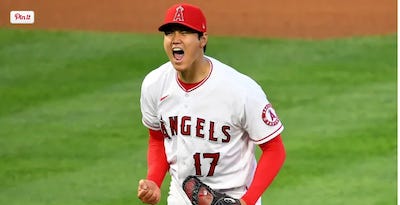
Shohei Ohtani Isn't Babe Ruth—He's Better: Ohtani is a once-in-a-century player in a year when we need to be awed, inspired and distracted. Comparing him to the Babe is no longer enough, Tom Verducci, Sports Illustrated, 7/2/21
Those who suggest Ohtani is compromising his greatness by not specializing—“He can be another deGrom!” “He can be another Yelich”—are missing the point of why he came to the major leagues and what is in his heart.
“I sat in the room with him,” says Angels manager Joe Maddon, then with the Cubs when Ohtani was a restricted international free agent after the 2017 season. “He made it clear he was coming here because he wants to pitch and hit. This is what he loves. He loves baseball and he loves the challenge. I will submit to you that by doing both you are seeing the best version of Shohei Ohtani, not by limiting him.”
And then the slow lip of fire moves across the prairie with precision
While, somewhere, with your pliers and glue, you make your first incision
And in a moment of almost-unbearable vision
Doubled over with the hunger of lions
Hold me close, cooed the dove
Who was stuffed, now, with sawdust and diamonds
—from “Sawdust and Diamonds,” Joanna Newsom
He wished his only daughter
to work in the bank
but he’d given her a source
to sustain her—
a weedy speech,
a marshy retainer.
—from “He Lived—Childhood Summers,” Lorine Niedecker
July 11 is the birth date one of EB White (1899-1985). Neruda and Thoreau are on the 12th, Woody Guthrie and I.B. Singer the 14th, Mari Evans the 16th and Erle Stanley Gardner and Christina Stead the 17th.
I hope all who are reading this are surviving our various weather and other challenges. Heat domes, hurricanes, droughts, the rise of a home-grown authoritarian movement, attacks on freedom of speech and thought, and how can we forget (as much as we might try) our never-ending pandemic - there is so much we need to do. I am reminded of that old NYC Con-Ed slogan, “dig we must” — we have no idea why, but we know we will make the effort.
Meanwhile, our garden continues to grow, and I am ever thankful for the miracles that plants demonstrate every day.
Stay well all.




